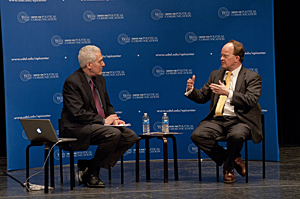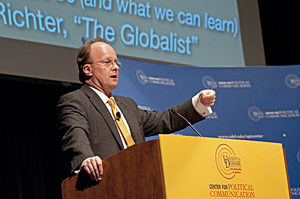
ADVERTISEMENT
- Rozovsky wins prestigious NSF Early Career Award
- UD students meet alumni, experience 'closing bell' at NYSE
- Newark Police seek assistance in identifying suspects in robbery
- Rivlin says bipartisan budget action, stronger budget rules key to reversing debt
- Stink bugs shouldn't pose problem until late summer
- Gao to honor Placido Domingo in Washington performance
- Adopt-A-Highway project keeps Lewes road clean
- WVUD's Radiothon fundraiser runs April 1-10
- W.D. Snodgrass Symposium to honor Pulitzer winner
- New guide helps cancer patients manage symptoms
- UD in the News, March 25, 2011
- For the Record, March 25, 2011
- Public opinion expert discusses world views of U.S. in Global Agenda series
- Congressional delegation, dean laud Center for Community Research and Service program
- Center for Political Communication sets symposium on politics, entertainment
- Students work to raise funds, awareness of domestic violence
- Equestrian team wins regional championship in Western riding
- Markell, Harker stress importance of agriculture to Delaware's economy
- Carol A. Ammon MBA Case Competition winners announced
- Prof presents blood-clotting studies at Gordon Research Conference
- Sexual Assault Awareness Month events, programs announced
- Stay connected with Sea Grant, CEOE e-newsletter
- A message to UD regarding the tragedy in Japan
- More News >>
- March 31-May 14: REP stages Neil Simon's 'The Good Doctor'
- April 2: Newark plans annual 'wine and dine'
- April 5: Expert perspective on U.S. health care
- April 5: Comedian Ace Guillen to visit Scrounge
- April 6, May 4: School of Nursing sponsors research lecture series
- April 6-May 4: Confucius Institute presents Chinese Film Series on Wednesdays
- April 6: IPCC's Pachauri to discuss sustainable development in DENIN Dialogue Series
- April 7: 'WVUDstock' radiothon concert announced
- April 8: English Language Institute presents 'Arts in Translation'
- April 9: Green and Healthy Living Expo planned at The Bob
- April 9: Center for Political Communication to host Onion editor
- April 10: Alumni Easter Egg-stravaganza planned
- April 11: CDS session to focus on visual assistive technologies
- April 12: T.J. Stiles to speak at UDLA annual dinner
- April 15, 16: Annual UD push lawnmower tune-up scheduled
- April 15, 16: Master Players series presents iMusic 4, China Magpie
- April 15, 16: Delaware Symphony, UD chorus to perform Mahler work
- April 18: Former NFL Coach Bill Cowher featured in UD Speaks
- April 21-24: Sesame Street Live brings Elmo and friends to The Bob
- April 30: Save the date for Ag Day 2011 at UD
- April 30: Symposium to consider 'Frontiers at the Chemistry-Biology Interface'
- April 30-May 1: Relay for Life set at Delaware Field House
- May 4: Delaware Membrane Protein Symposium announced
- May 5: Northwestern University's Leon Keer to deliver Kerr lecture
- May 7: Women's volleyball team to host second annual Spring Fling
- Through May 3: SPPA announces speakers for 10th annual lecture series
- Through May 4: Global Agenda sees U.S. through others' eyes; World Bank president to speak
- Through May 4: 'Research on Race, Ethnicity, Culture' topic of series
- Through May 9: Black American Studies announces lecture series
- Through May 11: 'Challenges in Jewish Culture' lecture series announced
- Through May 11: Area Studies research featured in speaker series
- Through June 5: 'Andy Warhol: Behind the Camera' on view in Old College Gallery
- Through July 15: 'Bodyscapes' on view at Mechanical Hall Gallery
- More What's Happening >>
- UD calendar >>
- Middle States evaluation team on campus April 5
- Phipps named HR Liaison of the Quarter
- Senior wins iPad for participating in assessment study
- April 19: Procurement Services schedules information sessions
- UD Bookstore announces spring break hours
- HealthyU Wellness Program encourages employees to 'Step into Spring'
- April 8-29: Faculty roundtable series considers student engagement
- GRE is changing; learn more at April 15 info session
- April 30: UD Evening with Blue Rocks set for employees
- Morris Library to be open 24/7 during final exams
- More Campus FYI >>
3:06 p.m., Feb. 24, 2011----Stephan Richter, founder, publisher and editor-in-chief of The Globalist, the daily online magazine on the global economy, politics and culture, discussed “How Others See Us” to open the 2011 Global Agenda speaker series on Wednesday evening, Feb. 23.
Richter, who is also the president of the Globalist Research Center, and was the North American adviser to the German Economics Ministry and vice chancellor of Germany, kicked off the series before a packed crowd at the University of Delaware's Mitchell Hall.
The series focuses on perceptions of America abroad, and Richter joined series moderator Ralph Begleiter, director of UD's Center for Political Communication, to discuss how other countries see us and what we can learn form their point of view. Richter started off the evening, noting that it is a difficult subject: “The United States is such a big country that everything you say about it is true; so is the opposite.”
Countries, he said, either love or admire us, hate or envy us, respect us or ignore us. While our want for personal freedoms has become part of the “global DNA, at the same time countries envy us because of our dominance materially and economically.”
“As Americans, we view the world out there that looks back at us ... with a permanent mixture of a cycle that goes from admiration, aspiration, being more like us, to perspiration, meaning trying to work hard to get like us, to frustration because we don't pay them proper respect.”
He emphasized that, in the past, the United States was admired among Europeans because of its determination and can-do attitude. “The United States, to them, always came across as a nation that's focused on rolling up shirt sleeves, look at problems honestly, gets cracking and gets it done,” he said. But recently the country has taken up some of the less great parts of European traditions like fighting with each other.
He said he believes we can learn as a country, from the perceptions of the United States that others have. In the past, he said the U.S. was admired based on four central principals: our middle class society, pragmatism, modernity and the societal capacity of tolerating change. “These four foundational principals of what constituted admiration of the United States are exactly what we have a hard time with these days in our own society,” Richter said. Today, he said he believes the country is moving in the opposite direction of modernity, and the debate of evolutionism is evidence of this.
To move forward, we must do what other countries do -- look to other nations and find ways to improve. He called this, “younger sibling syndrome” in that the older sibling, like the U.S., often paves the way for the younger one, but the younger one looks at what the older child did and finds ways that things could have been done better. Richter said we should look at what those after us have done and become more open to how they have operated. “I think it is key for us to look at the future,” he said.
But in moving forward, we should continue to use the perspectives of others to our benefit. “We should really look back to what made us great in the eyes of others, and we can learn a lot from that,” he said.
Global Agenda, now in its tenth season, is presented by the Center for Political Communication, with support from the Institute for Global Studies and the UD departments of Communication and Political Science and International Relations.
The series takes place at Mitchell Hall on Wednesdays. It is free and no tickets or reservations are required.
The next speaker will be Robert B. Zoellick, president of the World Bank, who will speak at 3:45 p.m., Wednesday, March 9. A complete schedule and details of speaker appearances are available at the Global Agenda website.
Article by Erica Cohen
Photos by Duane Perry



